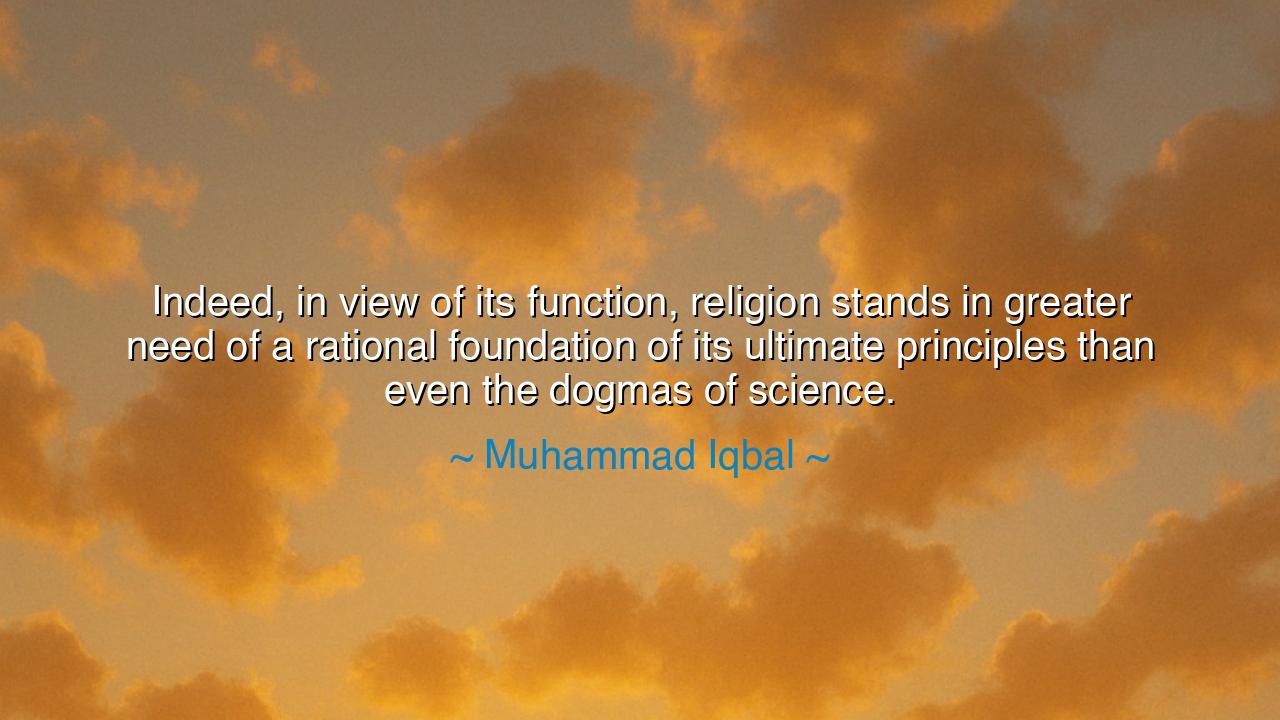
Indeed, in view of its function, religion stands in greater need
Indeed, in view of its function, religion stands in greater need of a rational foundation of its ultimate principles than even the dogmas of science.






Muhammad Iqbal, poet-philosopher of the East and awakener of sleeping nations, once proclaimed: “Indeed, in view of its function, religion stands in greater need of a rational foundation of its ultimate principles than even the dogmas of science.” These words are no idle flourish; they are a cry to elevate faith above blind habit, to root it not only in feeling but in reason, so that it may endure the tests of time. For science concerns itself with the material, the measurable, and the seen. But religion, reaching into the unseen and the eternal, shapes the very destiny of nations and the conscience of mankind. If it lacks a firm foundation, it crumbles, and when it crumbles, whole civilizations fall with it.
The ancients understood this tension. Plato sought to unite reason and divinity in his vision of the Good. The early Church Fathers wrestled with philosophy to give clarity to belief, lest faith be dismissed as mere superstition. Even in Islam, the great thinkers—Al-Farabi, Avicenna, Averroes—labored to reconcile revelation with logic, knowing that a creed without rational foundation cannot persuade the doubter nor inspire the seeker. Iqbal, walking in their footsteps, demanded that religion meet the same rigor as science, for its claim is greater: to shape how men live, die, and rise again.
Consider the story of Galileo. Science had revealed truths of the cosmos that seemed to threaten established faith. The Church, unwilling to reconcile revelation with reason, chose persecution over dialogue. Yet in the end, truth could not be silenced. What might have been harmony turned into conflict because religion refused the test of reason. Iqbal’s words point directly at such moments: when faith is too fragile to face questioning, it becomes brittle; but when it embraces inquiry, it becomes unbreakable.
And yet, O listener, remember this: Iqbal did not exalt science above religion. Rather, he placed upon religion the higher calling. For science, with all its triumphs, governs only the external world—the stars, the atoms, the body. But religion governs the inner world—the conscience, the soul, the meaning of existence. If science strays, a discovery may be delayed. But if religion strays, entire peoples may sink into tyranny, despair, or nihilism. Thus Iqbal warns us: the stakes of religion are greater, and so its foundation must be stronger.
History bears witness to his wisdom. When Islam’s golden age flourished, it was not blind dogma but a marriage of faith and reason that gave rise to medicine, astronomy, and philosophy. When Europe awakened in the Enlightenment, it was not the rejection of faith but the demand that faith stand upon reason and justice that propelled it forward. Where religion refused reason, darkness reigned; where it embraced it, light spread across nations.
The lesson is clear: do not fear reason in matters of faith. Question, reflect, test the foundations of belief. For a faith that shuns reason is a fragile house, ready to collapse when the storm comes. But a faith that welcomes reason is a fortress, unshaken by the winds of doubt. The true believer does not cower before questions, but knows that every sincere inquiry brings him closer to the truth of the divine.
Practical wisdom flows from this: if you are a seeker, do not accept without reflection; if you are a believer, do not fear to examine. Read widely, listen deeply, weigh claims with both heart and mind. Let your religion be not only a song of devotion but also a structure of thought, a harmony of spirit and intellect. In this way, your faith will not wither under scrutiny but shine brighter, for truth fears no light.
So remember, O children of tomorrow: religion stands in greater need of a rational foundation because it dares to govern not only the body but the soul, not only time but eternity. Honor it, test it, strengthen it, and you shall pass on to future generations a faith not of fear, but of light—unassailable, unbreakable, and everlasting.






AAdministratorAdministrator
Welcome, honored guests. Please leave a comment, we will respond soon